By Eric Vandenbroeck
and co-workers
Chinese Spies Part One
Top officials from
the U.S.
Justice Department unveiled a slate of indictments against 13 Chinese
nationals accused of spying on behalf of Beijing and seeking to disrupt a U.S.
government investigation into Chinese telecommunications giant Huawei. In a
broadside against Chinese espionage efforts in the United States, Attorney
General Merrick Garland announced indictments in three separate cases in New
York and New Jersey on Monday.
The announcement
comes as the Justice Department has increasingly cracked down on Chinese
intelligence operations in the United States, which have sought to gain access
to sensitive technologies, recruit former U.S. officials, and intimidate
dissidents into silence. FBI director Christopher Wray noted Monday that the
bureau was opening a new Chinese counterintelligence investigation every 12
hours. In 2020, the FBI announced that economic espionage cases
linked to China had increased by around 1,300 percent over the past decade.
The indictments come
on the heels of the Chinese Communist Party’s 20th National Congress, cemented Chinese leader Xi Jinping’s rule over the
country for the coming years, bucking recent tradition by enabling him to stay
in power for a third term in office. Under Xi’s tenure, China has forged a more
combative and assertive role on the world stage.
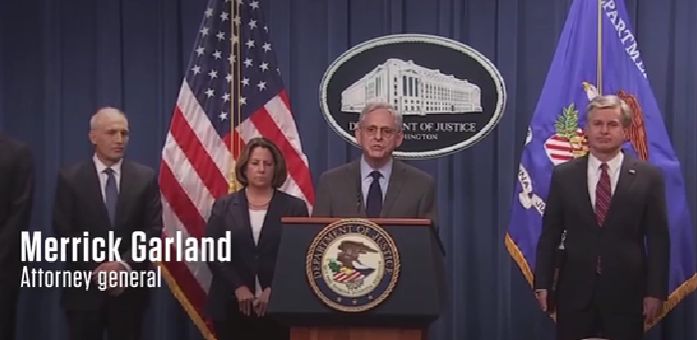
In a separate
scheme, prosecutors
allege that four Chinese nationals engaged in a decade-long scheme to recruit
individuals in the US to work as assets to the Chinese government and relay
information they deemed helpful to China’s intelligence objectives.
According to the
indictment, some Chinese intelligence officers, the defendants, worked under
cover of a fake think tank to try and recruit Americans, including university
professors, former federal law enforcement, and state homeland security
official. The defendants tried to bribe their targets with lavish gifts,
prosecutors allege, including an all-expense paid trip to China.
In a complaint in the
U.S. District Court for the Eastern District of New York, the Justice
Department accused two Chinese intelligence officers, Guochun He, and Zheng Wang, of attempting to obstruct
criminal prosecution proceedings against a “global telecommunications company”
based in China, which CNN reported refers to Huawei, citing a person
familiar with the investigation. (The complaint also referred to a February 2020
press release by
the Justice Department announcing a superseding indictment against Huawei, in
which the department described its investigation into the company as
“ongoing.”)
Ministry Of State Security Invades The
US
One of China's several spy schools is Jiangnan
Social University near Shanghai:
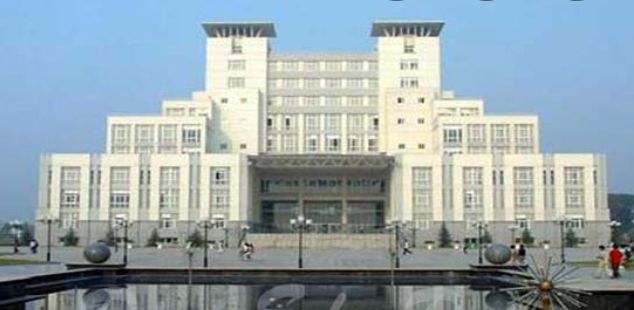
The Ministry Of
State Security (MSS) is the principal civilian intelligence, security, and
secret police agency of the People's Republic of China, responsible for
counterintelligence, foreign intelligence, and political security. The MSS is
active in industrial espionage and adept at cyber espionage. Its military
counterpart is the Intelligence Bureau of the Joint Staff Department. Described
as one of the most secretive intelligence organizations in the world, it is
headquartered in Beijing with subordinate branches at the provincial, city, municipality,
and township levels throughout China.
As China’s economy,
military, and ambition grew, so did the MSS. During the 1980s, it was only
beginning a long process of building front groups and networks. During this
period, the MSS had already recruited FBI asset Katrina Leung,
and several others whom the US intelligence community believed were its
informants. Hong Kong, Japan, and France were other priorities for these
network-building operations. The agency ramped up its infiltration of Chinese
communities in the aftermath of the Tiananmen massacre.
Towards the turn of
the millennium, the Chinese People's Liberation Army (PLA) influence operations
targeting President Bill Clinton’s 1996 re-election campaign, it was the MSS’s
turn to show what it could do. Finally, it was allowed to run operations out of
Chinese embassies and now had a solid network of bureaus across China to back
up its efforts. At the same time, a new generation of experts in the Western
world rose into the leadership of the MSS, turning its focus from roughing up
dissidents and watching foreign visitors to actively shaping the world. Yet the
same Social Investigation Bureau of the MSS led the way with its unrivaled
networks in the United States and international Chinese communities, largely
independent of any provincial bureaus or diplomatic missions.
In recent years, the
US government has blocked deals that would’ve put the dating app Grindr under
Chinese control and US chipmaker
Qualcomm under
Singaporean control (for fear of Chinese influence); it’s pressured multiple
Chinese companies to leave the New York Stock
Exchange; and Trump attempted
to ban WeChat and TikTok, the latter of which is still under
investigation by
an interagency national security panel.
Guochun He and Zheng Wang were charged in a criminal
complaint in federal
court in New York with obstruction of justice after allegedly offering bribes
to an unidentified U.S. government employee for details about an ongoing
criminal investigation.
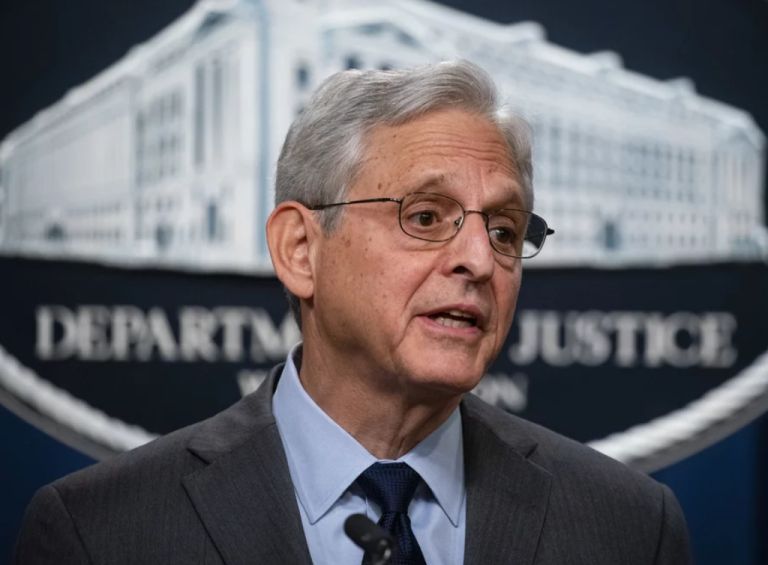
In separate cases,
seven Chinese citizens were charged with participating in a scheme to
force a Chinese-born U.S. resident living in New York to return to China. Four Chinese nationals have
been charged in the District of New Jersey with conspiring to
act as illegal agents on behalf of China by using a “purported” academic center in that
country to seek sensitive information from U.S. academic institutions.
According to the
complaint, the Chinese agents paid $61,000 in bitcoin to a U.S. law enforcement
official for information on the prosecution against Huawei, including
witnesses, trial evidence, and potential new charges to be brought against the
company. The complaint added that other payments made to the law enforcement
official—who was working as a double agent for the United States—included more
than $14,000 in jewelry and cash.
“This case exposes
the interconnection between [Chinese] intelligence officers and Chinese
companies, and it demonstrates once again why such companies, especially in the
telecommunications industry, should not be trusted to handle our sensitive
personal data and communications securely,” Deputy Attorney General Lisa Monaco said in a press conference Monday.
In New York, seven
people alleged to have been working on behalf of the Chinese government were
charged with waging a campaign of threats and harassment against a Chinese
national resident in the United States, promising to make the victim’s life an
“endless misery” unless he returned to China. Garland said in a press
conference on Monday that two of the alleged perpetrators were arrested on
Thursday.
The pressure
campaign, which included surveillance and frivolous legal complaints against
the victim and his son, was part of a “global
extralegal effort” on the part of the Chinese government known as “Operation Fox
Hunt,,” Garland said,
referring to a worldwide effort launched by Beijing in 2014 to force fugitives,
dissidents, and whistleblowers to return to China.
“The government of
China sought to interfere with the rights and freedoms of individuals in the
United States and to undermine our judicial
system that protects
those rights,” Garland said.
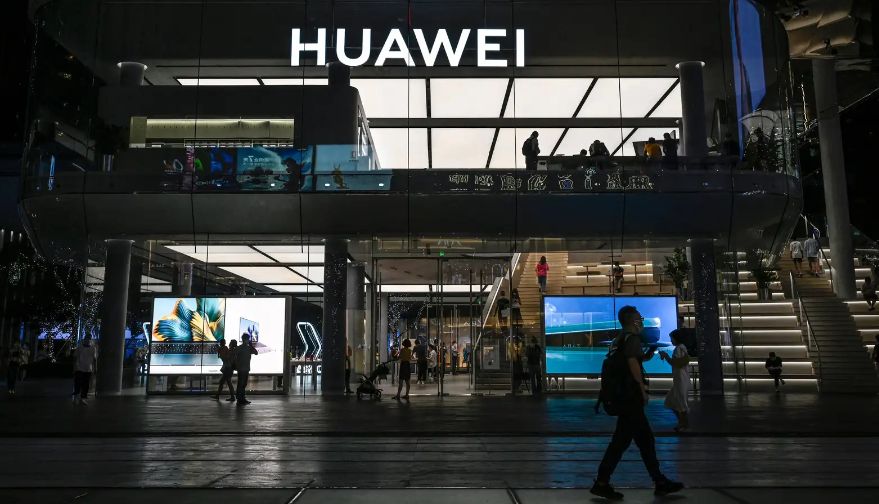
In a third case
unsealed on Monday, four
individuals,
including three Chinese intelligence officers, stand accused of having used a
fake Chinese academic institute to wage a campaign starting in 2008 that sought
to co-opt individuals in the United States from obtaining sensitive
technologies and stop protests that could have embarrassed Beijing.
Although the Justice Department
has sought to aggressively pursue instances of espionage on the part of the
Chinese government, the department has faced criticism from civil rights groups
that it has unfairly profiled Chinese and Asian American academics. China has
been known to use initiatives, such as its Thousand Talents Plan, to gain
access to U.S. intellectual property and research.
The MSS Invention Of China's Peaceful Rise
A middleman for
the MSS's Invention of China's Peaceful was none other then John L. Thornton chairman of the board
of the Brookings Institution.
Below Thornton speaks
during the 2011 Tsinghua Management Global Forum at Tsinghua SEM Auditorium in
Beijing on Oct. 25, 2011:
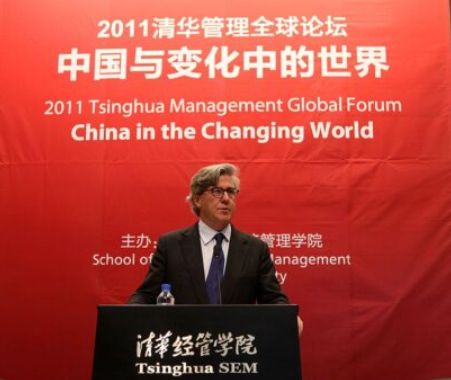
Towards the turn of the
millennium, the MSS found its forte. It still lacked the skill of organizations
like the CIA or Russian intelligence agencies regarding clandestine operations.
Finally, it began to get its head around the US foreign policy system and
appreciate the benefits of targeting weak points like think tanks, retired
officials, and the business community. After the embarrassing public failure of
PLA influence operations targeting President Bill Clinton’s 1996 re-election
campaign, it was the MSS’s turn to show what it could do. Finally, it was
allowed to run operations out of Chinese embassies and now had a solid network
of bureaus across China to back up its efforts. At the same time, a new
generation of experts in the Western world rose into the leadership of the MSS,
turning its focus from roughing up dissidents and watching foreign visitors to
actively shaping the world. Yet the same Social Investigation Bureau of the MSS
led the way with its unrivaled networks in the United States and in
international Chinese communities, largely independent of any provincial
bureaus or diplomatic missions.
Far from the smog and
concrete of Beijing, Hainan’s Bo’ao Forum for Asia is
the Party’s platform of choice to present itself to foreign notables in
painstakingly airbrushed technicolour. Each year,
hundreds of world leaders gather at the beachside venue to talk foreign policy.
They’re surrounded by marble and red carpets, immaculately groomed topiaries
and pedantically drilled staff, and probably a few thousand bugs and hidden
cameras. Outside, palm trees sway in the Pacific breeze, and beyond them
stretch the island’s famous sand beaches.
In November 2003,
Zheng Bijian stepped up to the podium at Bo’ao to deliver a speech that could not have been a
greater triumph. His articulation of the idea that China can peacefully become
a great power sparked excited discussion among China watchers and international
relations scholars around the world. It quickly caught on as his ‘theory of
China’s peaceful rise’, Zheng argued that China’s growth towards superpower
status, feared by some, would in fact ‘safeguard world peace’ and ‘boldly draw
on the fruits of all human civilization’.1
Of all the false
hopes China’s spies covertly peddled, none landed quite like ‘peaceful rise’.
For all of Bo’ao’s breeziness and pats on the back,
the ‘peaceful rise’ slogan was a cynically crafted riposte against growing
apprehension towards China’s mounting power. The theory and its untold origin
story lay bare how the Chinese Communist Party fooled the world about its
ambitions.
Zheng Bijian's article in
the prestigious Foreign Affairs Magazine:
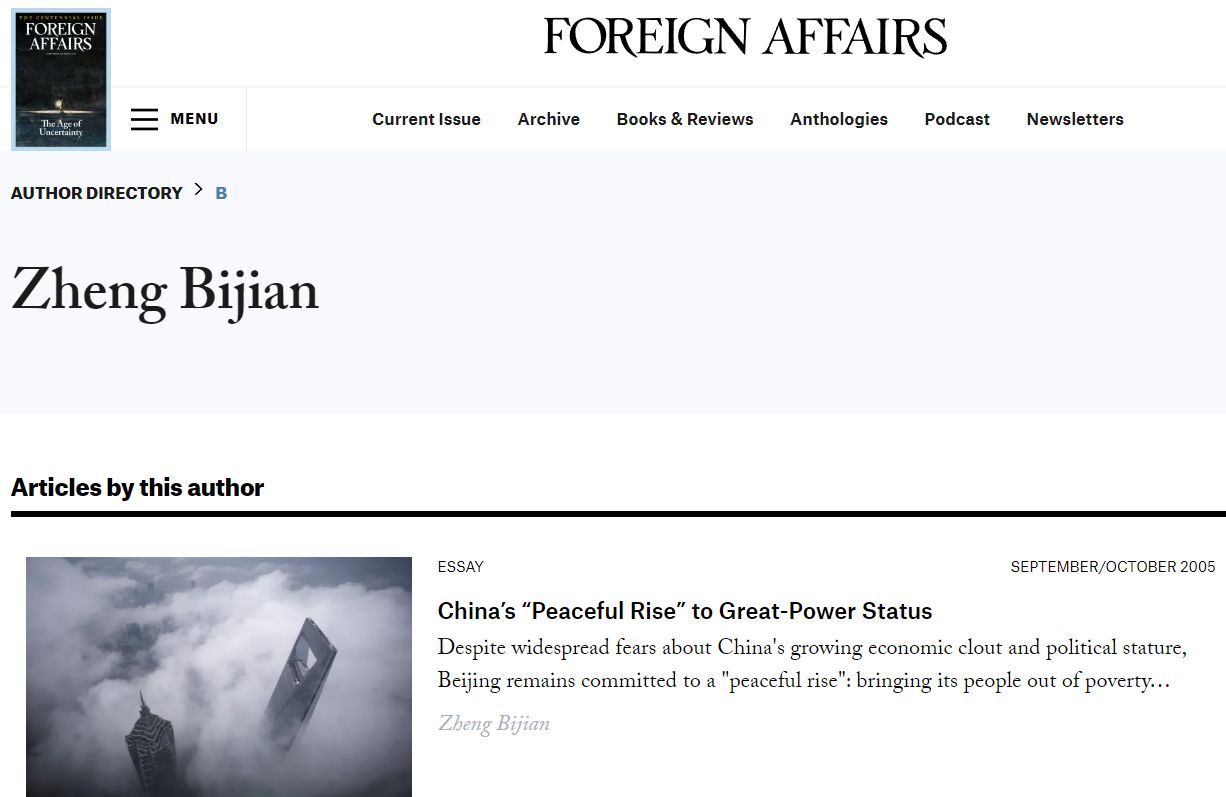
As Zheng argued in an
earlier speech at Washington, DC’s Center for Strategic and International
Studies, China would not be like Germany in World War One or Japan in World War
Two, which he thought were mistaken for attempting ‘to overhaul the world
political landscape by way of aggressive wars’. Nor would China be like the
Soviet Union, competing against the United States in an arms race and through
its global sphere of influence. According to Zheng, ‘China will have a totally
different path of development from the path of rise of all major powers in the
world since modern history.’
‘China’s only choice
is to strive to rise and, more importantly, to strive for a peaceful rise,’
Zheng said. The alternative path – that of confrontation and conflict with the
United States – was ‘doomed to failure’.2
China watchers,
policymakers and intelligence analysts took note, many with optimism and
hopefulness, describing Zheng’s idea in adulatory tones.3 Zheng was connected
to chiefs of the Party; he had developed a reputation as a ‘confidant’ or
trusted advisor to China’s leadership. His height, tone and experience make him
a strikingly statesmanlike figure.
1. Zheng Bijian, China’s Peaceful Rise: Speeches of Zheng Bijian 1997–2005, Brookings Institution Press, Washington,
DC, 2005, p.18.
2. Zheng, China’s
Peaceful Rise, p.15.
3. Bonnie Glaser
& Evan Medeiros, ‘The changing ecology of foreign policymaking in China:
The ascension and demise of the theory of “peaceful rise”’, China Quarterly,
no. 190, June 2007, pp. 291–310; Satoshi Amako,
‘China as a ‘Great Power’and East Asian integration’,
East Asia Forum,
www.eastasiaforum.org/2010/04/04/china-as-a-great-power-and-east-asian-integration
.
For updates click hompage here